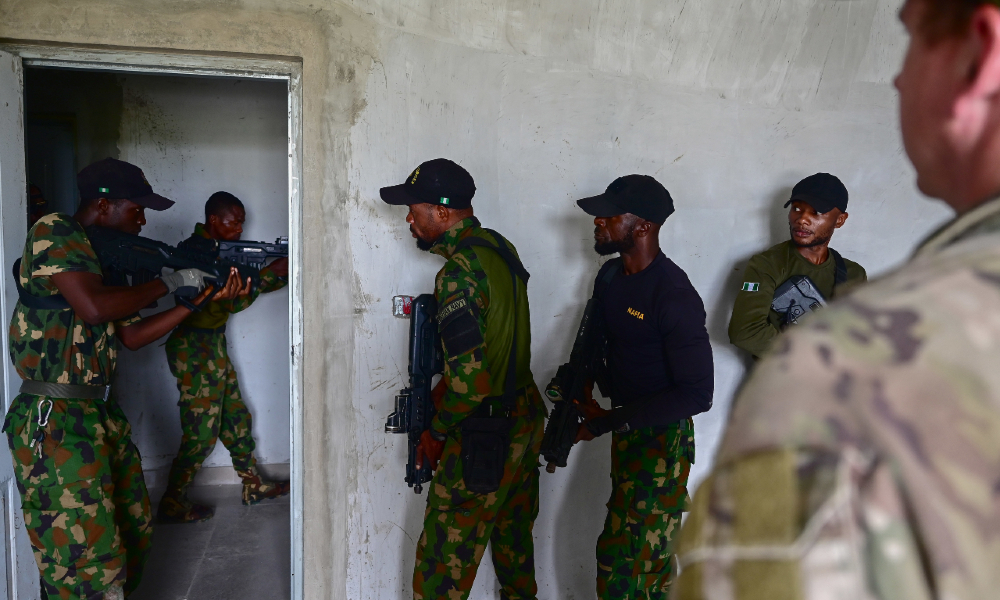Today's Headlines and Commentary
In a tweet this morning, President Trump first acknowledged that he is under investigation as part of the Russia inquiry and appeared to attack Deputy Attorney General Rod Rosenstein.
Published by The Lawfare Institute
in Cooperation With

In a tweet this morning, President Trump first acknowledged that he is under investigation as part of the Russia inquiry and appeared to attack Deputy Attorney General Rod Rosenstein. The New York Times reports that the tweet was the first time the president recognized that Special Counsel Robert Mueller is examining whether the president attempted to obstruct justice by firing FBI Director James Comey on May 9. The tweet intimated that the Deputy Attorney General, who authored a memo recommending that the president fire Comey and then appointed a special counsel to take over the Russia investigation, was leading a “witch hunt.”
The tweet follows an unorthodox statement released by Rosenstein late last night advising the public to be “skeptical about anonymous allegation.” The Times reports that both Rosenstein and a Justice Department spokesperson declined to comment, but the statement followed two anonymously sourced stories this week related to the Russia investigation, for which Rosenstein is Acting Attorney General. On Tuesday, the Washington Post reported that anonymous sources say that Special Counsel Robert Mueller will interview senior intelligence officials to investigate whether the president committed obstruction of justice; on Thursday, the Post reported that anonymous sources say investigators will scrutinize Jared Kushner’s business dealings as part of the investigation into possible collusion between the Trump campaign and the Russian government. The statement raised the question of whether the White House had pressured Rosenstein to refute those reports.
The Trump transition team has instructed former aides to preserve all Russia-related records, reports the Times. The order, conveyed in a memo from the general counsel’s office, suggests that Robert Mueller’s investigation into possible collusion with the Russian government may seek those records.
Vice President Mike Pence has retained criminal defense attorney Richard Cullen to assist with the handling of congressional committee and special counsel inquiries concerning possible collusion between Trump associates and Russia. Cullen is chairman of McGuire Woods and a former United States attorney for the Eastern District of Virginia. While Pence is unlikely to be a central focus of the investigation, his account may prove germane as the scope of investigation expands to an examination of whether President Trump obstructed justice with respect to the Russia probe. Pence’s decision to hire outside counsel follows similar decisions by Jared Kushner, who is represented by Jamie Gorelick of WilmerHale, and Trump, who hired Marc Kasowitz of Kasowitz, Benson, Torres in late May.
Meanwhile, the Times writes that Mueller’s appointment as special counsel has placed the independent former FBI director in the middle of a heated political fight. The President’s supporters have sought to paint Mueller and his team as politically motivated in an apparent effort to discredit the ongoing investigation.
The Defense Department pushed back on reports that Defense Secretary Jim Mattis will announce the deployment of an additional 4,000 troops to Afghanistan in an effort to halt the advance and further entrenchment of the Taliban. The AP’s initial story reports that the troops would largely train and advise Afghan forces, joining the approximately 10,000 U.S. and 5,000 NATO and coalition ally forces already stationed in the country. On Tuesday, President Trump delegated authority to set troop levels in Afghanistan to Defense Secretary Jim Mattis, who pledged in a hearing that day before the Senate Armed Services Committee that the Pentagon would submit a new Afghanistan strategy to Congress by mid-July.
The Russian government announced that it killed ISIS leader Abu Bakr al-Baghdadi in an airstrike last month, but the Pentagon is highly skeptical, Buzzfeed reports. A Pentagon spokesman stated that “we have no information to corroborate that reports.” Defense Department officials have heard no chatter among ISIS fighters related to Baghdadi’s supposed deaths during the two weeks since he was supposedly killed, and the Russian government’s claim that Baghdadi was meeting with at least one hundred other ISIS members who were also killed is inconsistent with the Islamic State’s practice of meeting in small groups.
Reuters reports that U.S. and Chinese diplomats will meet next Wednesday for the inaugural session of the U.S.-China Diplomatic and Security Dialogue, the security framework launched by Trump and Chinese President Xi Jinping on April 7. Secretary of State Rex Tillerson and Mattis will meet with Chinese State Councilor Yang Jiechi and Gen. Fang Fenghui in Washington to discuss curtailing North Korea’s nuclear program. The meeting will occur as concern builds among Trump aides that the administration’s singular focus on President Xi Jinping as the actor capable of reining in the North will fail to result in a change of course by the Chinese.
President Trump is expected to issue a policy directive on Friday calling for the reversal of key elements of the rapprochement with Cuba initiated by President Barack Obama in 2014. The directive will unravel a 2016 rule that authorized Americans to travel to Cuba without having to obtain prior authorization from the U.S. government or travel as part of a licensed tour group, and will bar Americans from conducting business with companies connected to the Cuban military, intelligence, or security sectors. The latter reversal will broadly affect the Cuban tourism, retail, and hotel industries, the majority of which are owned by the military’s business arm. While Trump’s directive will satisfy a campaign promise to the Cuban-American community, a core constituency that opposed the warming of relations with Cuba, it will go so far as to undermine other key elements of the détente.
The ACLU has submitted a FOIA request for government records concerning U.S. protocol for sharing foreign intelligence surveillance with foreign governments, the Atlantic writes. Among the requested records, the ACLU seeks “all agreements, memoranda of understanding, or other arrangements with foreign countries concerning the sharing” of surveillance data.
The International Monetary Fund and the EU reached an agreement yesterday concerning next steps in the $86 billion financial rescue of Greece, the Financial Times reports. The IMF will formally join the EU-led bailout of Greece, but will make up to $2 billion in funding conditional on an EU proposal for debt relief. The agreement paves the way for the EU’s release of $8.5 billion in bailout funds to cover Greece’s debt repayments that are due in July.
ICYMI: Yesterday, on Lawfare
Andrew Keane Woods outlined his testimony before the House Judiciary Committee on Thursday concerning cross-border data requests.
Daniel Byman assessed the Islamic State’s capacity to conduct attacks internationally as it loses territory in Iraq and Syria, and put forth recommendations for countering this threat.
Rebecca Crootof and Frauke Renz advocated for the establishment of a working group to consider recurring legal challenges and to design governance guidelines with respect to autonomous weapons.
Robert Litt counseled that the Privacy Shield authorizing the transfer of commercial data from Europe to the U.S. has not been compromised by actions taken by the Trump administration, contrary to concerns raised recently on this site by Cameron Kerry.
Ben Wittes posted the latest episode of the Rational Security podcast entitled “The Sessions Deathwatch” edition.
Email the Roundup Team noteworthy law and security-related articles to include, and follow us on Twitter and Facebook for additional commentary on these issues. Sign up to receive Lawfare in your inbox. Visit our Events Calendar to learn about upcoming national security events, and check out relevant job openings on our Job Board.





